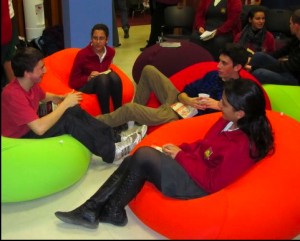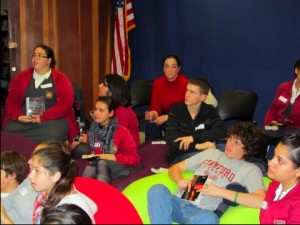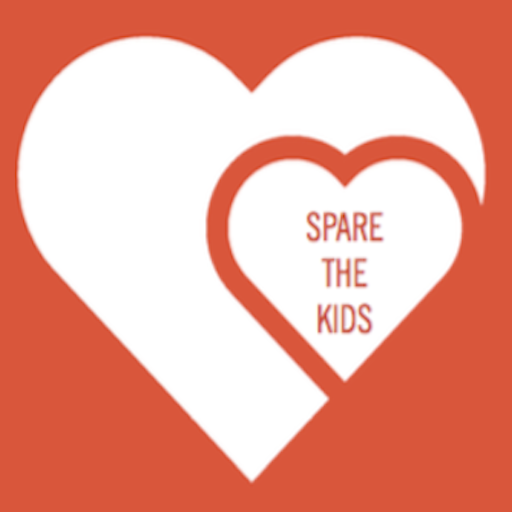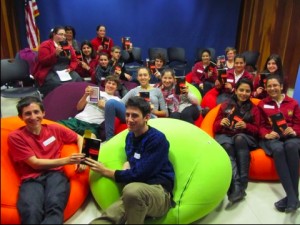By Dr. Stacey Patton
Just before the Thanksgiving holiday I took a virtual trip to Israel where I met up with about 20 Jewish and Palestinian high school teens who attend the Jerusalem Book Club four times a year to share pizza, lemonade and thoughts on the books they read together. I sat in a small drab studio in Brooklyn Heights while they perched themselves on colorful poufy chairs inside the American Center in Jerusalem and discussed my memoir That Mean Old Yesterday.
Organized in 2007, the Jerusalem Book Club is a cooperative project between the Schmidt’s Girls College in East Jerusalem and the Academy of Music and Dance in West Jerusalem. The club’s theme is – “Reading is Understanding.” Despite being neighbors in Jerusalem and surrounding areas, these Arab and Jewish teens rarely interact with each other in their every day life outside of their book club meetings.
I was surprised when Suzanne Sapir, one of the Jerusalem Book Club organizers, informed me that Arab and Jewish teens were reading That Mean Old Yesterday as their most recent pick. My initial reaction was, ‘Why would a group of teens living in radically different cultures want to read a book about a young African-American girl who was adopted, endured child abuse and survived the American foster care industry?’ ‘Why would these young people, who continue to endure political hostilities and unrelenting violence in their region, want to hear what I have to say about the history of slavery and racial terrorism and its impact on black families in America?’
‘What in the world could we possibly have in common?’
As they all sat side-by-side on the opposite side of the video monitor they asked important questions about the themes of my book, the writing process, healing and resiliency, and they brilliantly articulated what my work meant to them. One student told me that if he had to choose a soundtrack to accompany my life story it would be Sam Cooke’s “Change Is Gonna Come.” I was blown away by the students’ depth of knowledge of American history, black music and literature.
More importantly, they reminded me that there clearly are issues that transcend political boundaries, religion, and long-term feuds. I’ve kept in contact with a few of the teens via Facebook and email since our meeting. Some have shared their own personal challenges with physical and emotional abuse and others have talked about how much they enjoy coming together despite their differences. 
Last year a student told Sapir, “It is so nice to get together. We talk and laugh and enjoy discussing books. Why do people around us tell us that we are enemies and should not meet?”
Sapir said she almost fell off her chair. “That is what I always wanted these kids to realize,” she said by email.
Sapir initially got the idea to start the Jerusalem Book Club from watching an episode of Oprah that mentioned kids and book clubs. When the Israel and Palestine Center for Research and Information (IPCRI) and the Middle East Children’s Alliance (MECA), organizations dedicated to peace and recognizing the rights of Israelis and Palestinians and children, both ran out of funding Sapir knew she had to do something to address the impact of the conflict on young people. So she asked a Muslim friend and colleague to partner with her to begin a book club where Jewish and Arab teens would read books in English.
“My mission was to bring together kids who live in the same city but never connect, never socialize, never talk,” Sapir said. “It’s like they live in two different worlds. At the time, as well as now, it would be impossible to bring Arabs from the territories here or bring Israeli kids there.”
In 2007, Sapir traveled to the U.S. to visit her sisters. One of her sisters donated the first two sets of books – Alice Walker’s The Color Purple and William Golding’s Lord of the Flies. She returned to Israel with the books in her luggage and prepared for the first meeting. Since their first meeting the club has read books like The Wave, Jane Eyre, The Book Thief, The Kite Runner, Life of Pi, Mao’s Last Dancer, and A Long Way Gone, a book about a boy soldier in Sierra Leone who was rescued by UNICEF and now lives in New York City. In 2009 the book club received an award from a German organization for doing cooperative work in a conflict zone. The club received 1000 Euros to purchase more books.
 “The kids love getting together,” Sapir said. “They talk and laugh and do what all teenagers do – complain about school, etc. We usually discuss the books for an hour after doing icebreaker activities. At 5:00 it is over, but sometimes the kids stay and talk, talk, talk after the teachers leave!”
“The kids love getting together,” Sapir said. “They talk and laugh and do what all teenagers do – complain about school, etc. We usually discuss the books for an hour after doing icebreaker activities. At 5:00 it is over, but sometimes the kids stay and talk, talk, talk after the teachers leave!”
As I chatted, laughed and shared jokes about Hip Hop and reality TV shows like ‘The Jersey Shore’ and ‘Real Housewives of Atlanta’ I got the sense that the burdens of the Israeli-Palestinian conflict did not enter the room and certainly were not brought up in our conversation. Sapir said that she and the other organizers hope that by reading and discussing books together the students can somehow bridge the gap between them, overcome prejudices they have about each other, and become friends.
Sapir said, “There are many stories, good stories” about Arabs and Jews cooperating. “This info never gets out in the media,” she said.
Her biggest hope is that the teens will walk away with a vision that they can help others by making people aware of important issues. “Knowledge is power,” Sapir said. “Even one person has the power to change things. Books take you to different places.” Sapir also hopes that the teens may be inspired to write their own stories about growing up in Jerusalem.
One thing that we all agreed upon – African American, Jew, and Arab – is that abuse knows no boundaries and that healing, resilience, and friendship are universal necessities.
If you would like to support the Jerusalem Book Club by donating books or money please email Suzanne Sapir at sksapir@gmail.com.



Good to know about this! Empathy goes a long way!